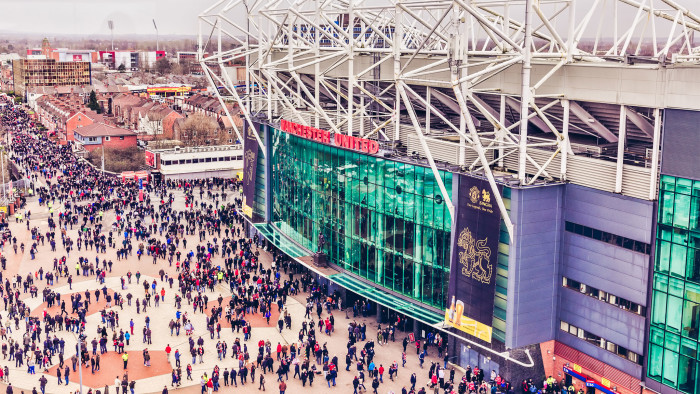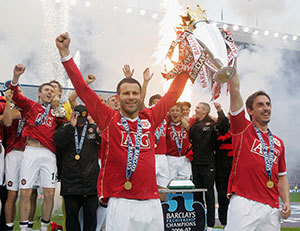Manchester’s new football hotel

Simply sign up to the Life & Arts myFT Digest -- delivered directly to your inbox.
I’m on the third floor of a new hotel in Manchester’s resurgent Salford area and the view is spectacular. Just a hundred metres from my window is the home of the most famous football club in Britain and, arguably, the world. The giant glass-and-steel façade of Old Trafford stadium, also known as the Theatre of Dreams, has been the stage for some of the game’s greatest footballers, from George Best to David Beckham, not to mention managers such as Sir Matt Busby, who won United’s first European Cup in 1968. From my window overlooking the East Stand, I can see Busby’s statue, looking out on to the road below, which is named after him.
It’s a view calculated to thrill any Manchester United fan. What’s more, Hotel Football, which opened last week, is not just on the doorstep of Old Trafford but is owned by a group of famous former United players including Gary Neville, now a popular pundit on Sky TV, and Ryan Giggs, who still serves as the club’s assistant manager. There are reminders of their achievements inside — a pair of Giggs’s boots from the 2008 Champions League Final here, a mural of him celebrating an important goal against Arsenal there. Even the bathroom products are set out in a tactical formation, with the players’ old shirt numbers on the back. Gary Neville’s “2” adorns a pouch filled with blackcurrant extract shampoo. His brother Philip, another of the hotel’s backers, is represented by a bar of soap.

Given its famous owners, and the location, there’s little doubt the £24m project will appeal to United fans round the world. There are plenty of them — a recent survey by the club estimated that it had 659m supporters worldwide; the hotel has just 133 rooms. But what about fans of other clubs, for whom the whole scenario might be more akin to being at the theatre of nightmares?
Gary Neville, who was no stranger to hostile fans during his two decades as a combative right-back for the club, is well aware that United inspires strong feelings but says people will find things to enjoy at Hotel Football whoever they support. “Whether people have respect or dislike for the club, they are drawn to United,” he tells me. And if people really don’t like the view of Old Trafford, they can always “shut the curtains”.
My room is mostly black-and-white, smart and unfussy, with sports channels on the TV and a complimentary minibar. (Minibars are a big deal for footballers, who spend much of their time in hotels and are not impressed when they find their manager has phoned ahead to ask the hotel to remove temptation.)

There’s a strong but mostly well-judged football theme. A framed illustration on one wall shows the history of World Cup ball designs over the years. The pillows imploring me to “Dream of victory” might be a step too far but I like the morale-boosting mural behind my bed — a bulging “you’ve scored”-style goal net. It’s an unpretentious, upbeat approach repeated across the whole building. There’s a rooftop football pitch which doubles as a pre-match barbecue area with panoramic views over the city as well as the stadium (entry costs £40 per person). “We pushed like crazy to get as big a space as possible for the pitch,” says Neville.
The restaurant, Cafe Football, exactly reprises the meaty menu from Neville and Giggs’s London sports bar and restaurant of the same name, save for the addition of steak pudding, chips, peas and gravy — a determinedly down-to-earth choice by Paul Scholes, another investor and former United player.

Neville says the players were hands-on, particularly in the design of the Old Trafford Supporters Club, a ground-floor bar open to all. Though when Stuart Procter, managing director of the company behind the hotel, GG Hospitality (GG being Gary and Giggsy), characterises their tastes as “understated and subtle”, my mind flicks momentarily to the mural behind my bed.
Former footballers are no strangers to the hospitality business. It used to be seen as something of a default career for players to run a pub after hanging up their boots. Dixie Dean, for example, a celebrated player who scored a record 60 goals in one season for Everton in 1928, followed his stellar career by running the Dublin Packet pub in Chester. Yet today’s recently-retired Premier League stars, having earned considerably more than their predecessors, can afford to think a bit bigger.
When a fan pointed out a bit of undeveloped wasteland at the top of Sir Matt Busby Way to Gary Neville in 2011 he only envisaged building a supporters’ club where fans could meet. “But United only have 21 or 22 games at home each year so it needed to be topped up by a business that worked all year round,” he says. “We were looking for a leisure product compatible with the supporters club and hotel rooms seemed the best way to go.”

Procter insists that Old Trafford is enough of a draw, even when there is no match on, to make the hotel a success. Visitors come year round to sightsee and take a tour of the stadium and the nearby National Museum of Football. The development of Salford’s MediaCityUK, a mixed-use site which includes offices and studios of BBC and ITV Granada, as well as the University of Salford, has also increased demand for places to stay in the area.
And yet, while the hotel’s ties with its setting are clearly its main strength, the group were keen not simply to create “a Manchester United brand” and thus hamper potential expansion. Hence the decision to launch Cafe Football in London and pitch it as a place for all fans, and the avoidance of too much red in the hotel’s logos and design.
Neville, who is also a coach for England’s national team, suggests a Hotel Football overlooking Wembley would be a prospect worth considering. “Expanding has to be an ambition over the next 10 years,” he admits, before falling back on some hard-earned football wisdom. “But you don’t win one match and then go and tell everyone you’re going to win the next 10.”
——————————————-
Details
Neil O’Sullivan was a guest of Hotel Football. Double rooms cost from £95, or from £250 on match days
Photographs: Carl Sukonik; Getty; Dominic Salter/Manchester Evening News; Matt Ratcliffe
Comments